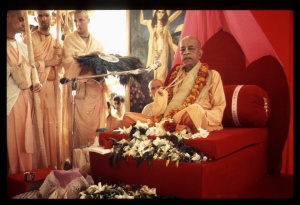CC Madhya 15.6: Difference between revisions
m (1 revision(s)) |
No edit summary |
||
| Line 1: | Line 1: | ||
{{ | [[Category:Sri Caitanya-caritamrta - Madhya-lila Chapter 15|C006]] | ||
<div style="float:left">'''[[Sri Caitanya-caritamrta|Śrī Caitanya-caritāmṛta]] - [[CC Madhya|Madhya-līlā]] - [[CC Madhya 15|Chapter 15: The Lord Accepts Prasādam at the House of Sārvabhauma Bhaṭṭācārya]]'''</div> | |||
<div style="float:right">[[File:Go-previous.png|link=CC Madhya 15.5|Madhya-līlā 15.5]] '''[[CC Madhya 15.5|Madhya-līlā 15.5]] - [[CC Madhya 15.7|Madhya-līlā 15.7]]''' [[File:Go-next.png|link=CC Madhya 15.7|Madhya-līlā 15.7]]</div> | |||
{{CompareVersions|CC|Madhya 15.6|CC 1975|CC 1996}} | |||
{{RandomImage}} | |||
==== TEXT 6 ==== | ==== TEXT 6 ==== | ||
<div | <div class="verse"> | ||
‘upala-bhoga’ lāgile kare bāhire vijaya | :‘upala-bhoga’ lāgile kare bāhire vijaya | ||
haridāsa mili’ āise āpana nilaya | :haridāsa mili’ āise āpana nilaya | ||
</div> | </div> | ||
| Line 12: | Line 16: | ||
==== SYNONYMS ==== | ==== SYNONYMS ==== | ||
<div | <div class="synonyms"> | ||
upala-bhoga | ''upala-bhoga lāgile—''when there is an offering of food known as ''upala-bhoga; kare ''bāhire vijaya—'' He remains outside; ''haridāsa mili''’—meeting Haridāsa Ṭhākura; ''āise''—comes back; ''āpana nilaya''—to His residence. | ||
</div> | </div> | ||
| Line 19: | Line 23: | ||
==== TRANSLATION ==== | ==== TRANSLATION ==== | ||
<div | <div class="translation"> | ||
After visiting the temple, Śrī Caitanya Mahāprabhu would remain outside during the upala-bhoga offering. He would then go meet Haridāsa Ṭhākura and return to His residence. | After visiting the temple, Śrī Caitanya Mahāprabhu would remain outside during the upala-bhoga offering. He would then go meet Haridāsa Ṭhākura and return to His residence. | ||
</div> | </div> | ||
| Line 26: | Line 30: | ||
==== PURPORT ==== | ==== PURPORT ==== | ||
<div | <div class="purport"> | ||
At noon, when there was an upala-bhoga offering in a place called bhoga-vardhana-khaṇḍa, Śrī Caitanya Mahāprabhu would go outside the temple. Before going outside, He used to stand near the Garuḍa-stambha column and offer His obeisances and prayers. Afterwards, the Lord would visit Siddha-bakula, where Haridāsa Ṭhākura lived. After visiting with Haridāsa Ṭhākura, the Lord would return to His own place at the abode of Kāśī Miśra. | At noon, when there was an ''upala-bhoga'' offering in a place called ''bhoga-vardhana-khaṇḍa'', Śrī Caitanya Mahāprabhu would go outside the temple. Before going outside, He used to stand near the Garuḍa-stambha column and offer His obeisances and prayers. Afterwards, the Lord would visit Siddha-bakula, where Haridāsa Ṭhākura lived. After visiting with Haridāsa Ṭhākura, the Lord would return to His own place at the abode of Kāśī Miśra. | ||
</div> | </div> | ||
__NOTOC__ | |||
<div style="float:right; clear:both;">[[File:Go-previous.png|link=CC Madhya 15.5|Madhya-līlā 15.5]] '''[[CC Madhya 15.5|Madhya-līlā 15.5]] - [[CC Madhya 15.7|Madhya-līlā 15.7]]''' [[File:Go-next.png|link=CC Madhya 15.7|Madhya-līlā 15.7]]</div> | |||
__NOTOC__ | |||
__NOEDITSECTION__ | |||
Revision as of 10:32, 2 September 2021

A.C. Bhaktivedanta Swami Prabhupada
TEXT 6
- ‘upala-bhoga’ lāgile kare bāhire vijaya
- haridāsa mili’ āise āpana nilaya
SYNONYMS
upala-bhoga lāgile—when there is an offering of food known as upala-bhoga; kare bāhire vijaya— He remains outside; haridāsa mili’—meeting Haridāsa Ṭhākura; āise—comes back; āpana nilaya—to His residence.
TRANSLATION
After visiting the temple, Śrī Caitanya Mahāprabhu would remain outside during the upala-bhoga offering. He would then go meet Haridāsa Ṭhākura and return to His residence.
PURPORT
At noon, when there was an upala-bhoga offering in a place called bhoga-vardhana-khaṇḍa, Śrī Caitanya Mahāprabhu would go outside the temple. Before going outside, He used to stand near the Garuḍa-stambha column and offer His obeisances and prayers. Afterwards, the Lord would visit Siddha-bakula, where Haridāsa Ṭhākura lived. After visiting with Haridāsa Ṭhākura, the Lord would return to His own place at the abode of Kāśī Miśra.